PACKAGE: The Everything Package (100 Hours)
| Average Ratings | |
|---|---|
| Five Stars | Not Rated |
![]()
![]()
![]()
![]()
![]()
“Your courses fit my needs perfectly.
They were ideal for someone who does not
have a great deal of flexibility, and I learned a lot.”
You’ve heard of the everything bagel, Professional Learning Board presents the everything PD course package, The Everything Self-Study Package, which includes the following TWENTY self-study courses adding up to 100 hours of professional development. Scroll down to see more information on the courses in this package.
|
The Everything Package (100 hours)
|
# Hours
|
|---|---|
|
Accommodating All Learners
|
5
|
|
Child Abuse Prevention
|
5
|
|
Classroom Collaboration
|
5
|
|
Classroom Management for Positive Behaviors
|
5
|
|
Cognitive Skills – Understanding Learning Challenges
|
5
|
|
English Language Learners in the Classroom
|
5
|
|
Ethics for Education Professionals
|
5
|
|
Formative Assessment
|
5
|
|
IEPs: Documentation and Implementation for Teachers
|
5
|
|
Internet Safety: Protecting Children in an Online World
|
5
|
|
Introduction to Autism
|
5
|
|
Introduction to Technology for Teachers
|
5
|
|
Reading Across the Curriculum
|
5
|
|
Recognizing Early-onset Mental Health Disorders in Children and Adolescents
|
5
|
|
Reflective Teaching Practices
|
5
|
|
Research Based Instructional Strategies
|
5
|
|
Student Portfolios
|
5
|
|
Transformative Classroom Management
|
5
|
|
Understanding ADHD
|
5
|
|
Virtual Field Trips
|
5
|
|
TOTAL
|
100
|
Accommodating All Learners
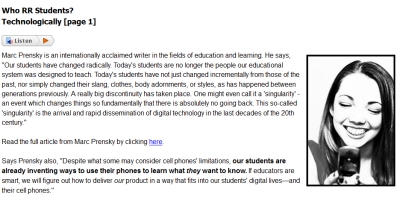 Reach and teach all learners by examining 21st century student and educator strengths in this research-based course packed with strategies, resources and tools. Participants will gain insight into both, their own learning and teaching preferences as well as the learning styles of students. Closely aligned with national standards and pedagogical goals.
Reach and teach all learners by examining 21st century student and educator strengths in this research-based course packed with strategies, resources and tools. Participants will gain insight into both, their own learning and teaching preferences as well as the learning styles of students. Closely aligned with national standards and pedagogical goals.
- Every Learner Learning
- Who’s Who: Teaching & Learning
- Who RR Students?
- Teaching Across Type
- Technology
- Theories & Strategies
Classroom Collaboration
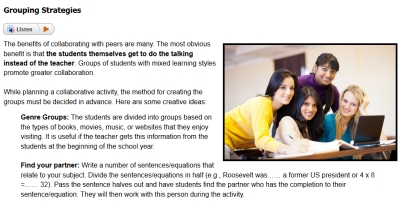 Implement collaborative learning in classrooms and develop successful learners. This framework enables teachers to recognize characteristics of collaborative classrooms, be aware of student and teacher roles, and practice group activities as an essential part of the classroom. Teachers are introduced to school-wide policy reforms in place today that promote collaboration and group activities. Teachers are also provided with ideas and strategies to accommodate learners, including students with special needs. The practical examples, real-life experiences, and templates in this online course provide teachers a structure to use in their own classrooms.
Implement collaborative learning in classrooms and develop successful learners. This framework enables teachers to recognize characteristics of collaborative classrooms, be aware of student and teacher roles, and practice group activities as an essential part of the classroom. Teachers are introduced to school-wide policy reforms in place today that promote collaboration and group activities. Teachers are also provided with ideas and strategies to accommodate learners, including students with special needs. The practical examples, real-life experiences, and templates in this online course provide teachers a structure to use in their own classrooms.
Cognitive Skills – Understanding Learning Challenges
The U.S. Department of Education, and others indicate that weak cognitive skills are the source of over 80% of learning problems.
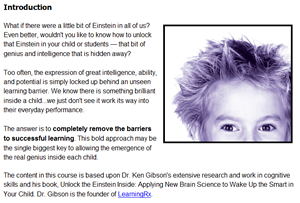 In this course you’ll come to understand the answer: students approach each task with varying learning tools. These tools are called cognitive skills, and these skills determine the quality, speed, and ease with which individuals learn and perform.
In this course you’ll come to understand the answer: students approach each task with varying learning tools. These tools are called cognitive skills, and these skills determine the quality, speed, and ease with which individuals learn and perform.
This course provides methods for detecting students with weak cognitive skills and tools to strengthen those skills. Teachers will receive understanding, as well as ways to apply development techniques in the classroom. The online class is fun and interactive and includes information about new brain research and how it can impact today’s classrooms.
Ethics for Education Professionals
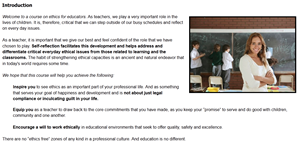 With the advent of the internet and smart phones, it’s easy for boundaries to become blurred. In the past it was rare for a student to call a teacher at home. Today, students and teachers are faced with numerous ways to contact one another 24/7. Things that in the past may have been black and white are now grey. Where do we draw the lines?
With the advent of the internet and smart phones, it’s easy for boundaries to become blurred. In the past it was rare for a student to call a teacher at home. Today, students and teachers are faced with numerous ways to contact one another 24/7. Things that in the past may have been black and white are now grey. Where do we draw the lines?
Even though most people believe that their actions are guided by logic and reason, we all have an innate ethical sense that urges us to make predictable choices. We each find words to create rationales that support our choices or decisions. However, ethics education is about recognizing the real power of our own innate ethical sense and how it influences our behaviors.
We build our ethical sense on beliefs that we already bring with us. This is why ethics is about individual’s personal choices. When we recognize and intuitively understand that ethics must be measured on a case-by-case basis, this type of ethical relationship can become a powerfully positive starting point for both educators and students. We must commit to broadening our understanding of ethical issues while at the same time seek to better understand the ideas of others.
Step inside this course and discover through reflection and introspection, an understanding of one’s innate ethical self. You’ll find tools and tips for bringing high standards of ethics into our schools and a variety of topics to explore practical ways to address ethical decisions in our lives at every stage.
Formative Assessment
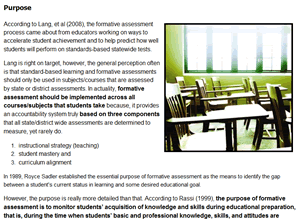 Is your school moving in the right direction?
Is your school moving in the right direction?
Can you tell if students are learning – how can you tell?
Brian Creasman became principal of a “low performing” high school and was confronted with these two questions. A high school classified as “low performing” obviously is not a title any teacher, administrator, student or parent wants for their school.
Out of everything (curriculum alignment, effective instructional strategies, etc.) Mr. Creasman learned that for an assessment to be effective, it should also be formative. Keep in mind that effective formative assessments result in instruction that meets the needs of each student. Formative assessments allow teachers to respond to the needs of the student quickly, however more importantly it allows the student to shape instruction (both a student-centered and teacher-driven education model).
The formative assessment program there continues and is constantly changing for the better. Once you have a well planned formative assessment program in place, your school will also see:
1) A change in the culture within classrooms
2) Concise communication of learning goals
3) Varied effective instructional methods
4) A new understanding for student learning
5) Improved student engagement with targeted student feedback
6) An increase in student learning!
Take the next step. Learn about and implement formative assessments in your school to discover and demonstrate for yourself, your students and your community what happens when a school moves in this direction and you know students are truly learning.
IEPs: Documentation and Implementation for Teachers
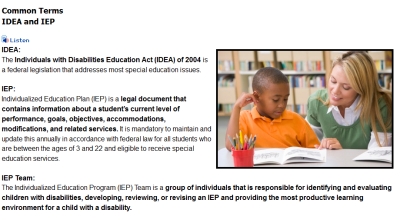 The goal of this course is to help teachers understand the IEP process and build the teachers comfort level in developing, aligning with and carrying out the IEP through rich examples and templates to help teachers understand and practically use the recommended strategies in a classroom setting.
The goal of this course is to help teachers understand the IEP process and build the teachers comfort level in developing, aligning with and carrying out the IEP through rich examples and templates to help teachers understand and practically use the recommended strategies in a classroom setting.
This course helps teachers provide children who have an Individualized Education Program (IEP) with an appropriate education in the least restrictive environment. It is designed to educate the educators on the various regulations and requirements while helping to develop a team that works together to improve educational results for children with special needs. Teachers will examine various supports and services a student with special needs may receive for instruction and testing.
Internet Safety: Protecting Children in an Online World
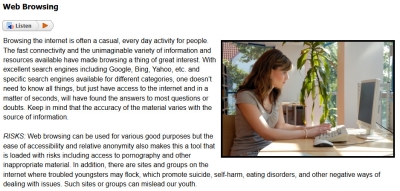 Issues that the youth of today, parents, teachers and those who are part of their world face online is the essence of this content. Participants discover areas of the Internet used by youth, what kinds of threats exist on the Internet and how everyone can protect their loved ones, family members, students and those under their care or responsibility. A special focus of the course includes ways in which adults can protect themselves online.
Issues that the youth of today, parents, teachers and those who are part of their world face online is the essence of this content. Participants discover areas of the Internet used by youth, what kinds of threats exist on the Internet and how everyone can protect their loved ones, family members, students and those under their care or responsibility. A special focus of the course includes ways in which adults can protect themselves online.
- Social networks
- Instant messaging & texting
- Chat rooms
- Gaming & virtual worlds
- Vulnerabilities of Children Online
- Cyberbullying
- Online predators
- Tips & tools for protecting children online
- And more…
Introduction to Autism
Most people today know someone with autism. People on the autism spectrum are in our classes, our neighborhoods and our families. Whether you know a little or a lot about autism, this course will give you useful information about the autism spectrum.
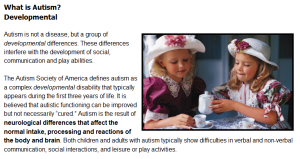 Although everyone on the autism spectrum is an individual, this course outlines a constellation of developmental differences common in autism that lead to the key concerns of social and communication issues.
Although everyone on the autism spectrum is an individual, this course outlines a constellation of developmental differences common in autism that lead to the key concerns of social and communication issues.
A person with autism experiences the world in a different way. They think and remember events differently. They react and communicate differently. By understanding the how and why of these differences, you can become one who gains insight.
Understanding some of the different issues people with autism must face can help us to be more understanding and improve our interactions. By understanding how students with autism function, we can make more informed choices in education and care and, maybe most importantly, we can assess our own automatic hard-wired responses that might occur when someone is truly different.
By understanding the underlying components of developmental differences in those on the spectrum, teachers, parents and others can reframe their own preconceived expectations and help support the learning and behavior for those with autism. Learn to more clearly understand the world from the perspective of someone with autism.
Introduction to Technology for Teachers
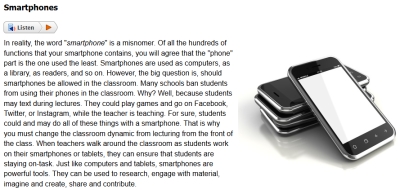 This interactive course introduces teachers to technology tools with one goal in mind: increasing teacher comfort level in using the Internet and today’s technology tools for teaching and learning. Teachers will learn new ways of using tools they are familiar with and be exposed to brand-new tools and applications for use both in professional development and with students in the classroom. Topics covered in this course:
This interactive course introduces teachers to technology tools with one goal in mind: increasing teacher comfort level in using the Internet and today’s technology tools for teaching and learning. Teachers will learn new ways of using tools they are familiar with and be exposed to brand-new tools and applications for use both in professional development and with students in the classroom. Topics covered in this course:
- Basic computer terminology
- Office applications
- Web tools
- Integrating technology in classroom lessons
- Using technology to enhance professional development
Reading Across the Curriculum
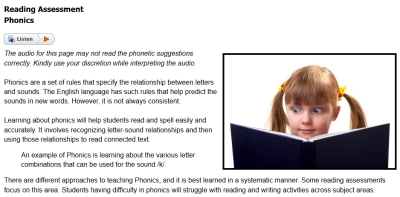 This interactive course is one option for K-12 teachers across the curriculum spectrum to demonstrate evidence of reading instruction techniques. Based on research, Reading Across the Curriculum introduces all teachers to sound reading instructional practices.
This interactive course is one option for K-12 teachers across the curriculum spectrum to demonstrate evidence of reading instruction techniques. Based on research, Reading Across the Curriculum introduces all teachers to sound reading instructional practices.
- Research
- Reading Range
- Meaningful Reading
- Strategies for Reaching All Students
- Includes Resources
- Reinforcement Activities
Recognizing Early-onset Mental Health Disorders in Children and Adolescents
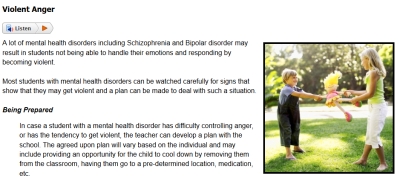 As educators and parents we are often, by default, among the first people to notice that a child may be experiencing problems. Completion of this course results in a basic understanding of warning signs of early-onset mental illness in children and adolescents which is useful to professional teaching and learning as it strengthens teacher-parent communications. Topics covered in this course:
As educators and parents we are often, by default, among the first people to notice that a child may be experiencing problems. Completion of this course results in a basic understanding of warning signs of early-onset mental illness in children and adolescents which is useful to professional teaching and learning as it strengthens teacher-parent communications. Topics covered in this course:
- What is mental illness
- Parent stages
- Communications
- What teachers can do
- Attention Deficit Hyperactive Disorder
- Oppositional Defiant Disorder
- Conduct Disorder
- Depression
- Bipolar Disorder
- Anxiety
- Schizophrenia
Have you wondered if your efforts and hard work are paying off? Have you spent time pondering over whether your teaching strategies are appropriate for your class and reviewing the results?
Developing a process of reflective thinking or reflective practice is a viable solution to this problem. Reflective practice is considered to be central to effective teacher preparation programs and the development of professional competence. A truly reflective teacher becomes sensitive and responsive to the needs, issues, and concerns that are so important in shaping qualitative educational practice. This course helps educators learn about various reflection and professional development practices that will enable you to become a reflective teacher and grow as an educational professional.
Research-based Instructional Strategies
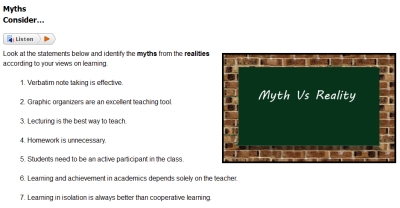 To help students improve in academic achievement, develop an attitude of learning and acquire the skills needed for the demands of the work place and real life situations, educators must continually review, reflect on and work to improve their instructional skills.
To help students improve in academic achievement, develop an attitude of learning and acquire the skills needed for the demands of the work place and real life situations, educators must continually review, reflect on and work to improve their instructional skills.
This course provides teachers with research based approaches and strategies that can be incorporated into classrooms. These will improve the effectiveness of teacher led instruction and encourage active student involvement in learning. These strategies and approaches are shown to have numerous benefits resulting in increased student achievement and learning.
Through this course, teachers can also have a look at their own views about teaching and learning, gaining a research based perspective on commonly believed myths in the educational field. Teachers are also provided with useful strategies in the areas of reading, writing and math. The course is rich in examples, templates and rubrics to help teachers understand and practically use the strategies in the classroom setting.
Student Portfolios
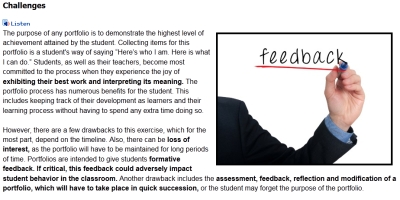 Successfully integrate portfolios to enhance students’ development and become an essential part of teaching and learning. Through the resources in this course, teachers are equipped to understand and use portfolios to emphasize the student’s role of taking responsibility for their learning and the teacher’s role of guiding that learning. The practical tips and suggestions provided in this course will take teachers through the process of implementing portfolios in their classrooms, with factual information clearly linking student learning to the actual goal.
Successfully integrate portfolios to enhance students’ development and become an essential part of teaching and learning. Through the resources in this course, teachers are equipped to understand and use portfolios to emphasize the student’s role of taking responsibility for their learning and the teacher’s role of guiding that learning. The practical tips and suggestions provided in this course will take teachers through the process of implementing portfolios in their classrooms, with factual information clearly linking student learning to the actual goal.
Teachers will be introduced to the concept of using portfolios as assessment tools, and the advantages of their implementation to both teachers and students. The resources included show teachers how to capitalize on the students natural tendency to save work, get them to take a second look and critically analyze how they can improve future work.
Questions answered in this course include – How do teachers take on the role of ‘portfolio advisors’, and guide students through the process of creating and maintain portfolios? What is the relevance of a portfolio? What are the objectives of an effective portfolio? Rich in examples, considerations, suggestions and tips for teachers, this course aims to enhance the teaching and learning experience for students.
Transformative Classroom Management
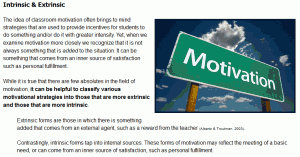 What makes a teacher successful in one school is the same thing that makes a teacher successful in the next school. It is true that all students are unique and group dynamics, cultural backgrounds, and experiences vary — sometimes dramatically. But for the most part, sound ideas get positive results and unsound ideas get mixed results at best.
What makes a teacher successful in one school is the same thing that makes a teacher successful in the next school. It is true that all students are unique and group dynamics, cultural backgrounds, and experiences vary — sometimes dramatically. But for the most part, sound ideas get positive results and unsound ideas get mixed results at best.
Not all ideas sold in the marketplace of classroom management strategies lead to desirable results. In fact, many of the most popular ideas result in more harm than good. For that reason, parts of this course are devoted to explaining why many of the most popular ideas in use today are flawed, and what to do instead.
This course is a synthesis of what’s effective in the area of classroom management. It builds on extensive time, real experiences of teachers, observations of hundreds of classrooms, research and the best ideas put into successful practice.
Understanding ADHD
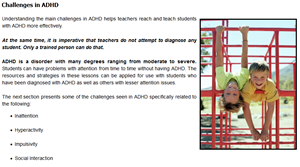 Have you ever come across a child who’s always on the move? They might have had ADHD. Attention Deficit Hyperactivity disorder or ADHD is seen commonly in today’s classroom. Children with this condition are restless, find it difficult to sit, are very impulsive and have a very short attention span. On the other hand they are also very intelligent and creative.
Have you ever come across a child who’s always on the move? They might have had ADHD. Attention Deficit Hyperactivity disorder or ADHD is seen commonly in today’s classroom. Children with this condition are restless, find it difficult to sit, are very impulsive and have a very short attention span. On the other hand they are also very intelligent and creative.
These energetic students can often disrupt a classroom. Thus, it becomes even more important for teachers to understand what this condition is all about and learn strategies to teach a child with ADHD.
This course does just that for you. It provides a variety of tips, adaptations and strategies that you can use while working in the classroom. You will learn about classroom modifications and adaptations that will help maintain order in the classroom. You will also discover methods for communicating more clearly with special educators and parents about their children. This course helps teachers gain confidence in not only handling ADHD, but also other students who are energetic, hyperactive or have difficulty paying attention.
Virtual Field Trips
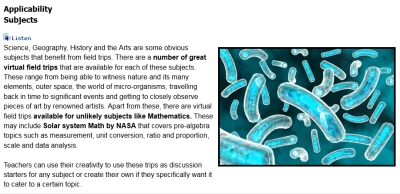 It is the wish of every committed teacher to help his or her students connect knowledge gained in the classroom with real life situations and process information in a way that takes them beyond the books. Teachers are constantly required to grab the attention of their students, keep them motivated and inspire them to own their learning.
It is the wish of every committed teacher to help his or her students connect knowledge gained in the classroom with real life situations and process information in a way that takes them beyond the books. Teachers are constantly required to grab the attention of their students, keep them motivated and inspire them to own their learning.
A well-planned field trip can serve all of these purposes in a unique way. Despite being known to be of great merit, schools across the country have been cutting short on such expeditions because of limited resources, whether financial constraints, personnel or time. This course offers a great alternative to teachers and encourages them to make the most of one of the most widely-available resources of our times – technology. Given the rapidly developing digital resources, teachers can take a diverse group of students on virtual field trips and offer them near-life-like experiences that will develop their thoughts and provide wholesome educational opportunities.
This course gives teachers a basic understanding of what virtual field trips are, the different types of trips and why they can be considered a valid alternative to actual field trips. It also offers a look at some concerns that surface while planning virtual field trips and how these can be addressed. The course also details the process of planning an effective virtual field trip with emphasis on how teachers can equip themselves technically. Looking at a selection of pre-existing virtual field trips, teachers will be able to understand the elements of a good trip. They will also learn how to create their own custom-made field trips using an array of online resources offered in the course.
Classroom examples will help teachers understand how they can incorporate these virtual trips in their lesson plans and the various roles they will play during these tours. Teachers will also be equipped to evaluate virtual field trips and will know their impact on student learning.


Reviews
No Reviews of “PACKAGE: The Everything Package (100 Hours)” yet.